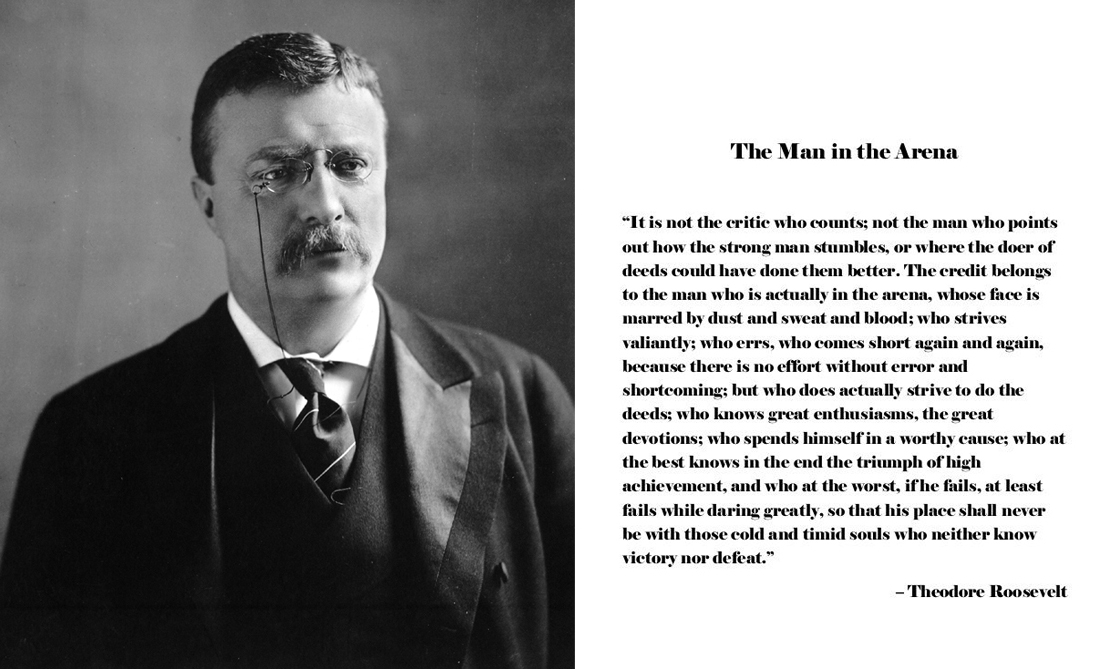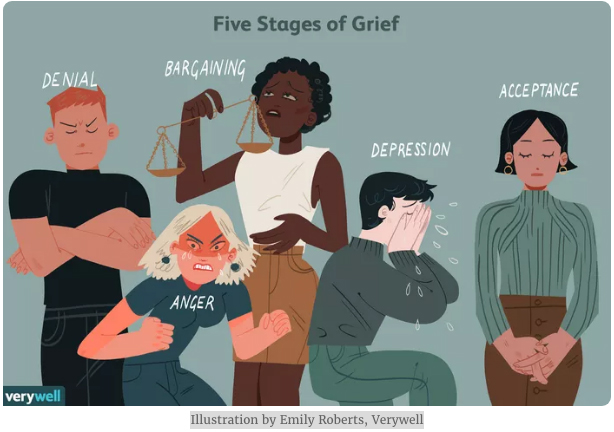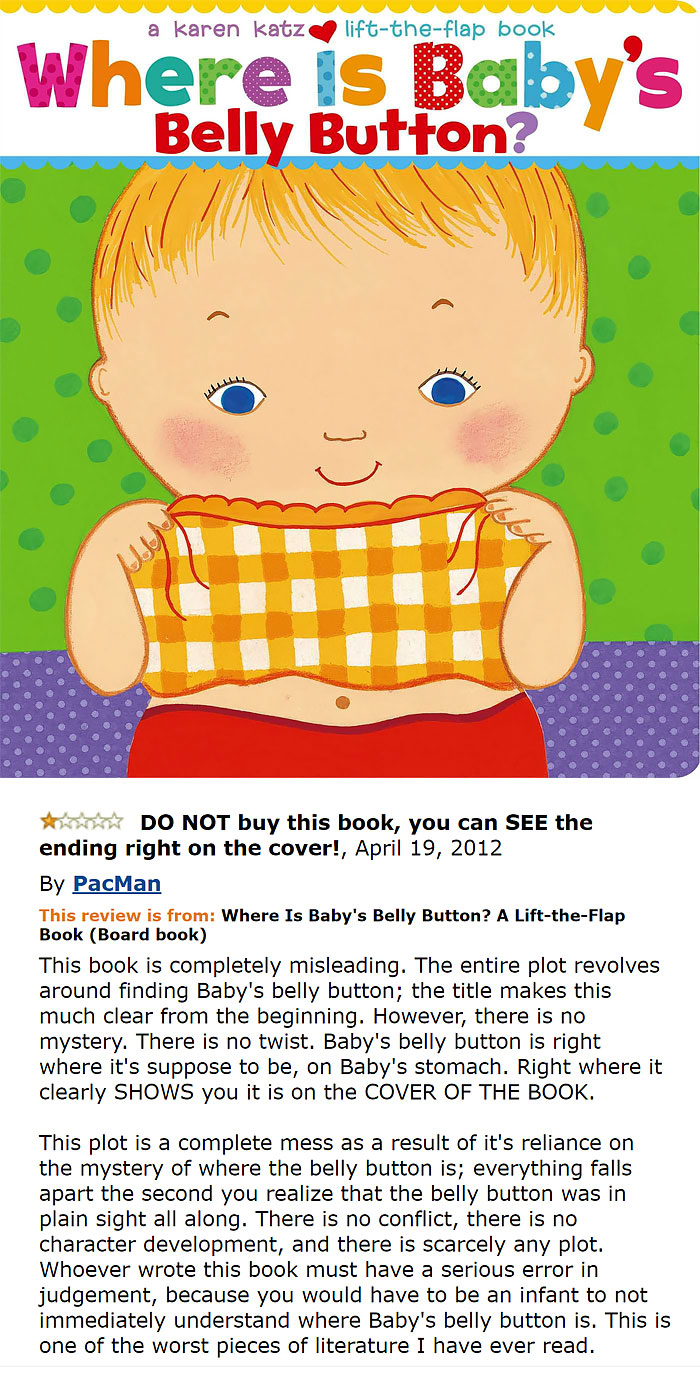When a negative review feels like a direct punch to the gut, remember this…
When a negative review feels like a direct punch to the gut, remember this: you’re in the arena and that’s a noble, worthwhile endeavor. I like to defer to Theodore Roosevelt when it comes to surviving and thriving despite what the critics (and some clients) say about you and your efforts.

A HUGE shoutout to all the women in the arena too.
So, what’s the best approach to ease yourself into and out of a bad review?
First of all, keep in mind the following truths:
1. It’s not personal.
I know, I know, don’t punch me in the gut now. Of course, it hurts and that hurt feels personal.
That reviewer doesn’t know how much blood, sweet, and hours and sleepless nights, etc. you spent building your business, your products, your services. They don’t know because they’re only clients (not partners nor mind readers and they may have really terrible taste in food).
They don’t know that you’re also a good partner who builds bikes for vulnerable kids, who donates money to food shelters, cooks a mean pasta Bolognese, runs triathlons at 50 and picks up empty wrappers off the ground because you care about the environment.
Basically, they don’t know you’re a human and don’t always see you behind your products, services and solutions.
So keep the criticism local to the item at hand and remember products, services and solutions don’t have feelings, only people do (and apparently, animals).
2. You’re only human (and your business is run by and staffed with other humans).
And as a human, you have the right to not be perfect. In fact, it’s impossible for humans to be perfect.
As we’ve established, without a doubt, in another post, ain’t nobody perfect. Remember you are (and are doing) enough and that’s a great thing.
3. You can’t please everyone.
Damn it! Thank god! Whichever camp you’re in, it’s time to give up the ghost on that idea. Especially because some people just perpetually reject pleasure. (Avoid them whenever possible unless you’re Tinkerbell. Then, by all means, fairy dust them away.)
Then there are those clients who live in alternate universes whether they be fictitious or full of half-truths (like the review below). Do what you can to reveal the truth of the situation with kindness (and/or humor where appropriate) so you can at least maintain your integrity and dignity.

4. Deliberately choose a growth mindset.
I’m not trying to go all Pollyanna on you, but it will make you a better human and you’ll be happier for it.
If you’ve built your own company then you are part of the elite business performer class. You know how important mindset is in enhancing your skills and upping your game.
When choosing a growth mindset, remember that sometimes it may feel like Lieutenant Dan taking on a hurricane with glee in Forrest Gump.
No, you don’t have to have a death wish but you do need to be willing to embrace and tolerant high levels of discomfort with a sort of f*** ‘em all type bravado (best saved for private moments).
Now, for a brief interlude on feelings. Specifically, those underlying the grief process: denial, anger, bargaining, depression and acceptance.

Sometimes a bad review can be highly disruptive and triggering. Ugh.
When this happens, you may find yourself cycling through the grief process (albeit a smaller, shorter one).
If you find yourself in a place of intense emotion, take a break. Walk away. Breathe. Listen to some heavy metal. Watch something humorous on YouTube.
Whatever you gotta do to move through it. It’s okay. We all need some time when feelings run high. Again, we’re only human. Please do not try and shove these feelings in the closet or under the rug.
Feelings are funny in that they’re like boomerangs. It may seem like a good idea to ignore them at the time, but if left ignored, they always boomerang back and oftentimes, with a bigger punch (and the fun mystery of not knowing where exactly they’re gonna hit you or someone else…).
So, take the time to move through your entire grief process till you’re in acceptance. Once you hit acceptance, then, and only then, prepare your response to that bad review.
Before we dig into how to actually respond to that bad review, let’s take a quick break.

See? Breaks are a great way to reset.
Now, it’s time to dive into the ideal way to handle a negative review.
1. Read it again and sort out facts from fiction.
Is everything they wrote true? Were they able to articulate accurately what the real issue is they’re having? Probably not. Most clients only leave reviews when they’re pissed and they want you to know they’re pissed and they need to vent their pissed-off-ed-ness.
Anger can really inflate bad reviews turning dust bunnies under a bed into nefarious, 20-feet tall, vampires that disrupt movie night with their fangs and lust for blood. Right…so pull out the facts and shake off any distortions caused by strong emotions.
For example, say the customer’s feedback says that your submarines are awful because they don’t have screen doors. Interesting…(eyebrows raising now).
So, you and I both know that screen doors in a submarine would defeat their primary purpose – to not sink with people in it.
What is your client really trying to say? Maybe they just want better airflow and a feeling of more openness in your submarines. Sometimes, it’s important to make sense of a client’s sense.
2. Figure out which feedback your company is responsible for and what can be done about it.
Be honest. Again, it’s okay to have made a mistake. Usually, companies don’t even realize there’s a problem or issue until a client brings it up.
All of us business owners have blinders in certain areas and it’s actually helpful when clients show us where they are (the sooner, the better, right?). Take the time to troubleshoot or resolve the issue (with your team if needed) so that you can let the client know what actions you’ll be taking to resolve it.
If there isn’t a quick solution, let them know and tell them you’ll follow up when there is one or you have more info. When it isn’t a quick fix solution, try to at least find them a workaround till the issue can be resolved.
Returning to the submarines. You’re responsible for making them safe and functional (aka fully submerge for long periods of time without sinking). And you’re also responsible for making them habitable for humans for extended periods of time.
Can your company create better airflow and a more open floor plan without dramatically increasing costs? If not, would certain clients be willing to pay more money for this feature to warrant this option?
3. Empathize with the client and validate their feelings and experiences.
No one likes to be disappointed especially when they spent money and time for that disappointment (or they have to live on a submarine for months on end).
Validating the client’s feelings doesn’t mean that you’re conceding they’re 100% right. It’s just saying that you see they’re human too and understand how it feels to be angry, disappointed, livid, bummed out, etc.
For example, “George, thank you so much for taking the time to share your experiences living aboard a submarine. We hear you that it’d be nice to have a screen door while living down there for months on end…”
4. Tell them how you plan to resolve the issue that your company is responsible for and can solve.
Seriously, if you validate their feelings and experiences and tell them how you’re going to fix it or make it more manageable for the time being, most clients are quick to forgive and forget.
Really, don’t we all just want to get on with our lives in the end? Help your clients do that.
With this in mind, the second part of your response might read something like this:
“…While we can’t promise you a screen door, we might be able to help create the feeling of having a screen door without causing the submarine to sink by increasing airflow and exploring more open format layouts. We’re so grateful that you took the time to share your thoughts with us and we’re going to take your suggestions to our design and engineering team to see if/how we can make these two things a possibility. Might you be available to talk with us more about your experiences? If not, can you please send us your contact info so that we can update you on our developments? Again, thank you for your honesty and recommendations. They’re really helpful.”
Though bad reviews can, and often do, suck, oftentimes they carry silver linings when clients point out a company’s “blind spots.”
By encouraging and soliciting feedback from your clients and responding in kind to the negative ones (after cleaning up your side of the emotional street, of course), you demonstrate that you care about the humans using your products, services and solutions.
You show that your company is trustworthy, empathetic and dedicated to finding meaningful solutions.
In the end, this approach will result in you getting more clients while encouraging you to stay in the arena, “spending [your]self in a worthy cause.”
Now that you’ve learned how to survive and respond to a bad review. It’s time to refocus on how to attract the right clients to your company’s offerings by creating damn good content that gets read, which is coming up next…
Got Marketing Questions? We can help.
By clicking this button, you submit your information to Scott Growth Strategies, who may use it to communicate with you regarding this and other services.
